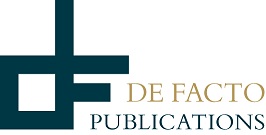Defacto Publications
De facto means “in fact or actuality,” with or without legal authorisation or approval by lawful authority. The term also designates what happens in practice, not what might happen in theory, computer models or utopias. In a more philosophical sense, de facto means that no a priori authority is required to produce reality and that facts exist irrespective of approval, disapproval, consensus or opinion.
More and more, “authority,” in the form of legal and administrative power, is used to construct an “authorised” reality by prohibiting, coercing and “nudging” human activities and behaviour. The law is applied to coerce, not to protect against coercion. In constructing a politically desirable “authorised” reality, science, especially generally accepted “settled science,” is used as the preferred and incontestable justification of policy.
Where power and science meet, freedom and liberty suffer when we circularly ask ourselves: “How must the world be, so that I can prove it ?” Placing the quest for “scientistic” proof over unbiased and free observation, reduces what we can know about the world to what can be proven. What cannot be proven shall and will remain unknown. The “unknown” does not exist and doesn’t merit our care and attention.
De Facto Publications proposes that we allow ourselves and others to make the effort to know by taking a free and undelimited view on life and human activities, and that we shall not look away from the world by staring at it through the rear-view mirrors of ideologies, consensus and scientific, political or religious orthodoxy.
De Facto Publications was founded in 2011 by investigative writer-researcher Bert Schwitters.



